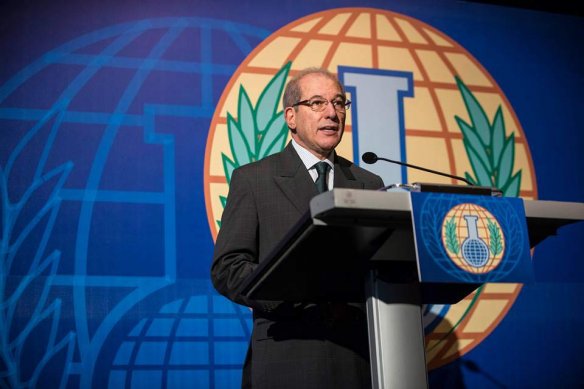Why would anyone take it upon themselves to offer speculations on who is to win the Nobel Peace Prize every year? With close to 300 nominees, most of which are secret to everyone but the committee, and a virtually unlimited number of possible winners, the chance of getting it right seems slim. Foreign Policy listed my Nobel speculations as one of the 10 worst predictions in 2012. In a recent op-ed in Aftenposten, Norway’s leading national newspaper, Peace Prize Committee Chair Thorbjørn Jagland complains about the noise from a range of experts and commentators, against which the committee needs to shield itself. If the odds for getting it right are so poor, and the criticism so direct, why would anybody want to, year after year, offer speculations on who is to be the Nobel Peace Prize Laureate?

Last year’s unanticipated Nobel Peace Prize laureate, the Organisation for the Prohibition of Chemical Weapons, here represented by Director-General Ahmet Üzümcü. Photo: OPCW
Most importantly, the speculations inspire a debate on what the Nobel Peace Prize should be about. Those of us privileged with spending most of our time studying issues of peace and war have a duty to contribute to that debate. Alfred Nobel’s will, written in 1895, is both brief and succinct. The Peace Prize shall be awarded “to the person who [during the preceding year] shall have done the most or the best work for fraternity between the nations and the abolition or reduction of standing armies and the formation and spreading of peace congresses.” Nobel described this as the prize “for advocates of peace”, and did not use the term Peace Prize. The world has changed, and how to interpret Nobel’s intentions is anything but trivial. What, for example, constitutes a ‘peace congress’ in the early 21st century? From the beginning of this century, we saw an expansion of definitions, to reward work for the environment (the late Wangari Maathai; Al Gore and the Intergovernmental Panel on Climate Change), to economic development (Muhammad Yunus and Grameen Bank), all prizes that were widely criticized for being outside of Nobel’s declared peace prize sphere. The past five years, under Jagland’s leadership, we have seen a return to more conventional justifications: disarmament, multilateral cooperation, human rights.
The global debate about the Peace Prize, in which the speculations play a minor – but in my opinion, important – role, is also important for the quality of nominations. With more people familiar with the fundamental purpose of the prize, as well as the concrete process through which a particular candidate can become seriously considered, the committee ought to get more and better nominations. Certainly, there is a lot of lobbying, and there have been times when the committee has been misled by effective campaigners (the 1974 prize to Eisaku Sato is one example). Mussolini, Hitler and Stalin have been nominated, none of which are exactly lauded for their peace advocacy. It is also worth remembering that until 1960, when South African Albert Luthuli received the prize, all laureates were from the Western hemisphere. Among recent prizes, the one to Barack Obama in 2009 is probably the one that has been faring the worst, irrespective of the committee’s insistence that his reigniting of nuclear disarmament talks and a new treaty with Russia alone justified the prize. Given the stature of the Peace Prize, controversy is to be expected, and the committee has proven, time and again, that it stands its ground, even when subject to extensive pressure – as with the prize to Liu Xiaobo in 2010.
In informing a global debate about deserving causes and candidates for the Peace Prize, speculations also offer a critical corrective to the work of the Nobel committee. The committee’s work is veiled in secrecy: there is no written record of its deliberations, and its documentation is made public only after 50 years (documents on the process that led to the 1964 prize to Martin Luther King, Jr. have just been made public, subject also to an exhibit at the Nobel Peace Centre in Oslo). Nobel Chair Jagland expressed it well in his recent op-ed: “Critique is good. Critique is the artery of society.” Just as any other institution entrusted with the power to make important decisions, the Nobel Committee depends on a critical public exchange. The Nobel Peace Prize has a remarkable history and is widely seen as the most prestigious prize on earth. That success has not come about in a vacuum, but through an engaged public debate over concrete candidates, the issues they represent, and the intentions expressed by Alfred Nobel in his will.
Even if the Nobel committee’s announcement of the 2014 Peace Prize laureate this coming Friday should not lend support to my speculations, I will continue to offer them. The Nobel Peace Prize is an important prize, which, to maintain its international stature, depends on critical friends. Given the secrecy, we will never know for sure what the impact of speculations is on the committee’s deliberations. I am in no doubt that, even if failing to identify the successful candidate, the speculations inform the global public debate on the Nobel Peace Prize and what it represents.